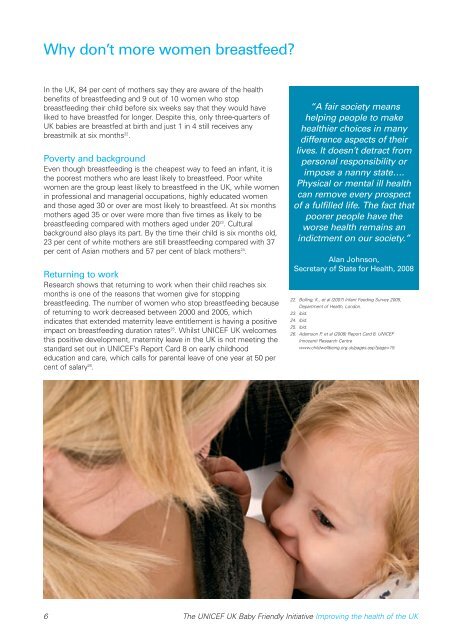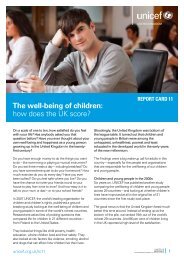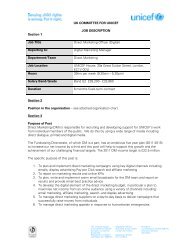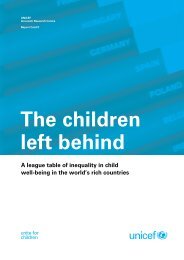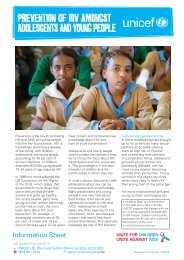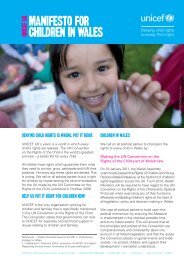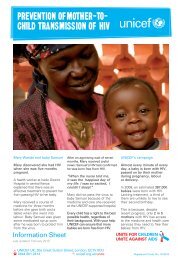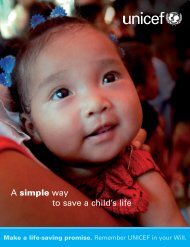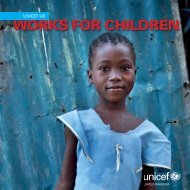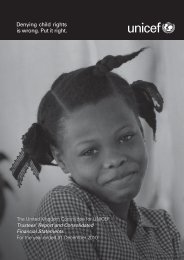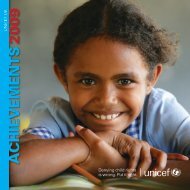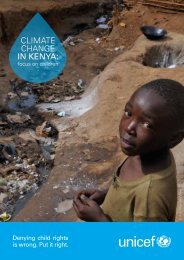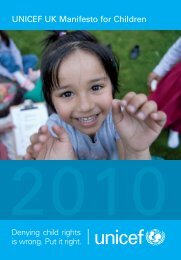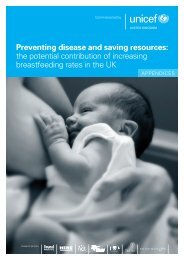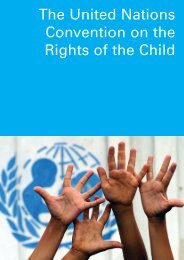The UNICEF UK Baby Friendly Initiative Briefing Paper 2009
The UNICEF UK Baby Friendly Initiative Briefing Paper 2009
The UNICEF UK Baby Friendly Initiative Briefing Paper 2009
Create successful ePaper yourself
Turn your PDF publications into a flip-book with our unique Google optimized e-Paper software.
Why don’t more women breastfeed?<br />
In the <strong>UK</strong>, 84 per cent of mothers say they are aware of the health<br />
benefits of breastfeeding and 9 out of 10 women who stop<br />
breastfeeding their child before six weeks say that they would have<br />
liked to have breastfed for longer. Despite this, only three-quarters of<br />
<strong>UK</strong> babies are breastfed at birth and just 1 in 4 still receives any<br />
breastmilk at six months 22 .<br />
Poverty and background<br />
Even though breastfeeding is the cheapest way to feed an infant, it is<br />
the poorest mothers who are least likely to breastfeed. Poor white<br />
women are the group least likely to breastfeed in the <strong>UK</strong>, while women<br />
in professional and managerial occupations, highly educated women<br />
and those aged 30 or over are most likely to breastfeed. At six months<br />
mothers aged 35 or over were more than five times as likely to be<br />
breastfeeding compared with mothers aged under 20 23 . Cultural<br />
background also plays its part. By the time their child is six months old,<br />
23 per cent of white mothers are still breastfeeding compared with 37<br />
per cent of Asian mothers and 57 per cent of black mothers 24 .<br />
Returning to work<br />
Research shows that returning to work when their child reaches six<br />
months is one of the reasons that women give for stopping<br />
breastfeeding. <strong>The</strong> number of women who stop breastfeeding because<br />
of returning to work decreased between 2000 and 2005, which<br />
indicates that extended maternity leave entitlement is having a positive<br />
impact on breastfeeding duration rates 25 . Whilst <strong>UNICEF</strong> <strong>UK</strong> welcomes<br />
this positive development, maternity leave in the <strong>UK</strong> is not meeting the<br />
standard set out in <strong>UNICEF</strong>’s Report Card 8 on early childhood<br />
education and care, which calls for parental leave of one year at 50 per<br />
cent of salary 26 .<br />
“A fair society means<br />
helping people to make<br />
healthier choices in many<br />
difference aspects of their<br />
lives. It doesn’t detract from<br />
personal responsibility or<br />
impose a nanny state….<br />
Physical or mental ill health<br />
can remove every prospect<br />
of a fulfilled life. <strong>The</strong> fact that<br />
poorer people have the<br />
worse health remains an<br />
indictment on our society.”<br />
Alan Johnson,<br />
Secretary of State for Health, 2008<br />
22. Bolling, K., et al (2007) Infant Feeding Survey 2005,<br />
Department of Health, London.<br />
23. ibid.<br />
24. ibid.<br />
25. ibid.<br />
26. Adamson P, et al (2008) Report Card 8. <strong>UNICEF</strong><br />
Innocenti Research Centre<br />
www.childwellbeing.org.uk/pages.asp?page=15<br />
6<br />
<strong>The</strong> <strong>UNICEF</strong> <strong>UK</strong> <strong>Baby</strong> <strong>Friendly</strong> <strong>Initiative</strong> Improving the health of the <strong>UK</strong>


